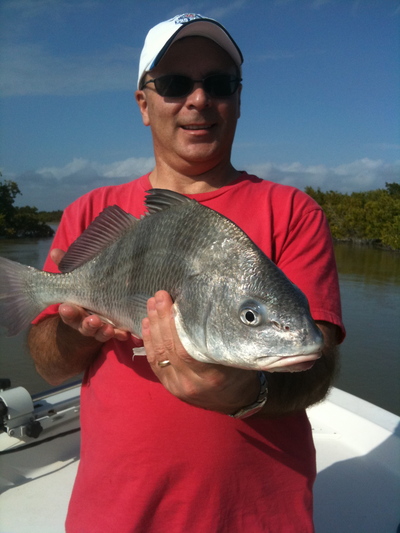The Florida Bay has certainly taken a big hit with the cold weather. Catfish, grouper, snapper, barracudas, boxfish, triggerfish, eels, bonefish and snook have all been adversely affected. Many of these fish can't take the stress of a prolonged deep chill like we recently experienced. The results are apparent daily in the backcountry and even out on the reef. I've personally witnessed a slew of dead snook, goliath grouper, two tarpon and one bonefish among scores of baitfish. But not all reports are dire. It seems the redfish and black drum have been spared for the most part. As of this writing, the weather has improved and so has the fishing. While the devastation is evident almost anywhere you travel on the water there is evidence that the fishery will bounce back quickly, just as it has done it the past.
On the reef, the sailfish bite has been unbelievable. The Florida Keys Outfitters Annual Sailfly tournament managed to break records with 20 boats catching 18 sailfish on fly in two days of outstanding fishing. Kudos go to Tim and Robert Klein of Islamorada for an amazing victory.
In the backcountry, the action hasn't been quite as furious. At the beginning of the week, the water temperatures were an eye-opening 48 degrees in some areas. When the air temps rose, so did the water back in the Bay, as much as 15 degrees. That's good new for the fish, the bay and for the anglers. While the water becomes more habitable in the deeper channels and runoffs, the flats are still nursing one heck of a hangover. The sharks, stingrays and other flats critters are still waiting for the caffeine to kick in before they venture up onto the flats to forage for food. Instead, the fish seem to be holding deep.
You can imagine that with the fish getting larthargic and now probably very hungry, the best methods used were a quarter-ounce jig with a live shrimp bounced slowly off the bottom. When I say slow, I mean that the cast should be made up-current, allowed to sink to the bottom and let it roll along the bottom until the current (or fish) lifts it up off the bottom. Then recast. The bites have been very subtle. When you feel a slight tap, don't jerk or set the rod. Increase the speed of the retrieve and come tight. This technique was used to catch some pretty fickle trout, redfish and black drum this week. The bottom of the tide seemed to be best until the tide came in and then the bite slowed down again. Sometimes you might have to move the boat slightly or to a totally different region and keep exploring areas where fish should hold. The deeper pockets and channels are holding plenty of fish. Just be sure to cover the area thoroughly and slowly. No bites? Move on. That's what the fish are doing, so should you.

